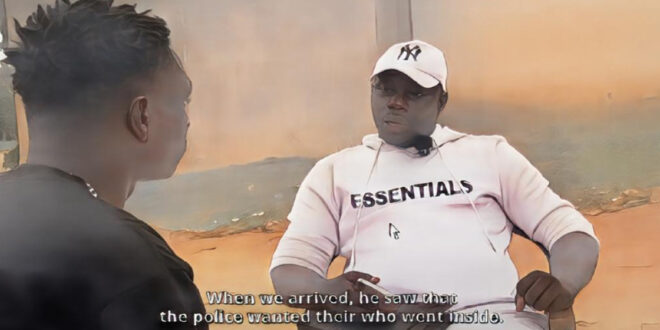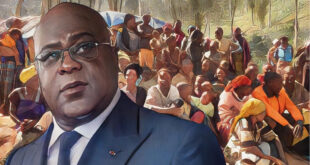The Dream That Started It All
Have’ was doing well in Ivory Coast. He had a stable job, a steady income, and lived happily with his loved ones. But like many, he was driven by the desire to do more—to give his family a better life.
He often heard stories of people leaving Africa, heading to Europe, and returning rich. He longed to experience that “magic” too. Eventually, his dream came true—at least, that’s what he thought.
Have’ left Ivory Coast with high hopes, believing he was heading to Europe. But instead of stepping into opportunity, he stepped into a trap. His destination wasn’t Europe. It was Kuwait—and he didn’t even know he was being trafficked.
An Interview with the Victim
Have’ recalls:
“I was so traumatized. Sometimes, while working, I feared my boss was nearby. I’d hear gunshots. He wanted me to know that if I resisted, he wouldn’t hesitate to kill me.”
The False Promise
Have’ Speaks:
“I’m Have’, a former migrant and a survivor of human trafficking in Kuwait in 2015. I want to share my story—how, without even realizing it, I was sold as a slave in the 21st century.
Like many young Africans, I had the dream of ‘going on an adventure’. My job in the cocoa industry back home paid poorly, even though I was the director of a cooperative. I wanted more—for my education, for my family. That’s when a friend introduced me to someone who ‘helped people travel abroad.’
We met in Abidjan. The man claimed he could get me to Qatar, where I could earn enough in two years to change my life. But the visa he showed me wasn’t for Qatar. It was for Kuwait.
When I asked why, he reassured me: ‘Jobs in Qatar don’t pay well. Kuwait is better.’ I believed him. I didn’t know better. He said I needed to travel through Mali. I agreed. On August 30, 2015, I left Ivory Coast for the first time in my life.”
The Warning Ignored
Have’ continues:
“In Mali, people were waiting for us—part of a network smuggling migrants to Gulf countries. At the airport, a police officer looked at our documents and warned us:
‘Kuwait is not a good place. The living conditions are harsh, and foreign workers are mistreated.’
We were scared. But we had already invested so much. So we boarded the plane. Once we landed, everything changed.
First, we were taken to a mosque. When I said I was Christian, they gave me books to learn how to pray their way. We were then locked inside a house. Later, one by one, we were ‘handed over’ to strangers—in exchange for money.”
The Desert of Despair
Have’ recalls:
“I was taken to a house where an Indian man told me, ‘Tomorrow, I’ll take you to your workplace—in the desert.’
At first, things seemed okay. My boss was kind. He gave me gifts. Other workers said he was the nicest among his brothers. It was all a trick.
After a month, he paid me. But when I converted the salary, it was only 120,000 CFA francs—nothing close to what I was promised. I called the man in Ivory Coast who arranged my trip. He said, ‘Be patient. We’ll change your workplace.’
But then, the payments stopped. When I asked my boss for my salary, he said:
‘What salary? I bought you for 400 dinars (around 800,000 CFA francs).’
That’s when I realized: I was not an employee. I was a slave.
I worked from 5:00 AM to 2:00 AM every day—herding animals, cooking, cleaning, doing masonry work. Sometimes I served food for 20 people alone. One day I collapsed. An Ethiopian man insisted they take me to a hospital. After three days, I was discharged—only to be ordered to haul 50kg of animal food immediately.”
Hell at the Hands of His ‘Owners’
Have’ shares:
“The man’s father, who initially seemed kind, once tried to run me over with his car. He shouted,
‘Do you think you’re worth more than my sheep? If you refuse to work, I’ll kill you!’
That day, I knew my life was in danger. Thankfully, a friend I had traveled with had just created a WhatsApp group. He reached out and offered to help me escape.
I shared my GPS location. But we had to wait a week. During that time, the boss exploited me further—making me do dangerous, unpaid construction work.”
The Great Escape
Have’ narrates:
“I came up with a plan. I made a meal with too much salt hoping the Sudanese man I lived with would leave to eat at his brother’s. But he liked it. Fortunately, he told me to go charge my phone at his brother’s place.
That was my chance. I packed my bags under my blanket and quietly ran. I ran across the desert in darkness, ducking to avoid headlights, dodging guard dogs and watchmen. I was terrified.
Finally, I reached a paved road. My phone’s battery was dying. I called my friend and asked him to turn on his hazard lights so I could spot his car. When I saw him, I ran and got in. He asked about my bags. I said, ‘I left them. My life is more important.’“
From Slavery to Jail
Have’ reflects:
“The man who helped me escape took me to his house. But I was so traumatized, I was afraid to get out of the car—afraid my boss would be there.
After a few days, another Ivorian man helped me get a job as a security guard—someplace safe. But the fear never left me.
Eventually, the police arrested me for not having documents. I had only a copy of a Nigerian man’s ID who had helped me. I didn’t want to get him into trouble, so I said nothing.
In prison, an Egyptian man warned me: ‘Negotiate with the police, or you’ll stay here forever.’ I told them everything. They tried to call my boss to get my passport. He refused. Worse, he wanted me sent back to the desert.”
The Fight for Freedom
Have’ concludes:
“I remembered the Togolese man who had helped me escape. The police interrogated him too, but he had pretended not to know me. Still, he stayed in touch with me.
Unfortunately, they caught him too—after he refused to work during a phone call. They beat him badly. I don’t know what happened to him afterward.”
Final Reflections
Have’ says:
“From the first day I arrived in Kuwait, I knew I was in hell. I decided: either I die here, or I return and expose this man.
He told my family lies—that I didn’t want to work, that I was sabotaging his business. Meanwhile, I was barely surviving. I escaped with nothing. But I escaped with my life.
Today, I continue to tell my story—not just for myself, but for everyone still trapped.”
 Cmtv News News -Education – Entertainment – Sports
Cmtv News News -Education – Entertainment – Sports







